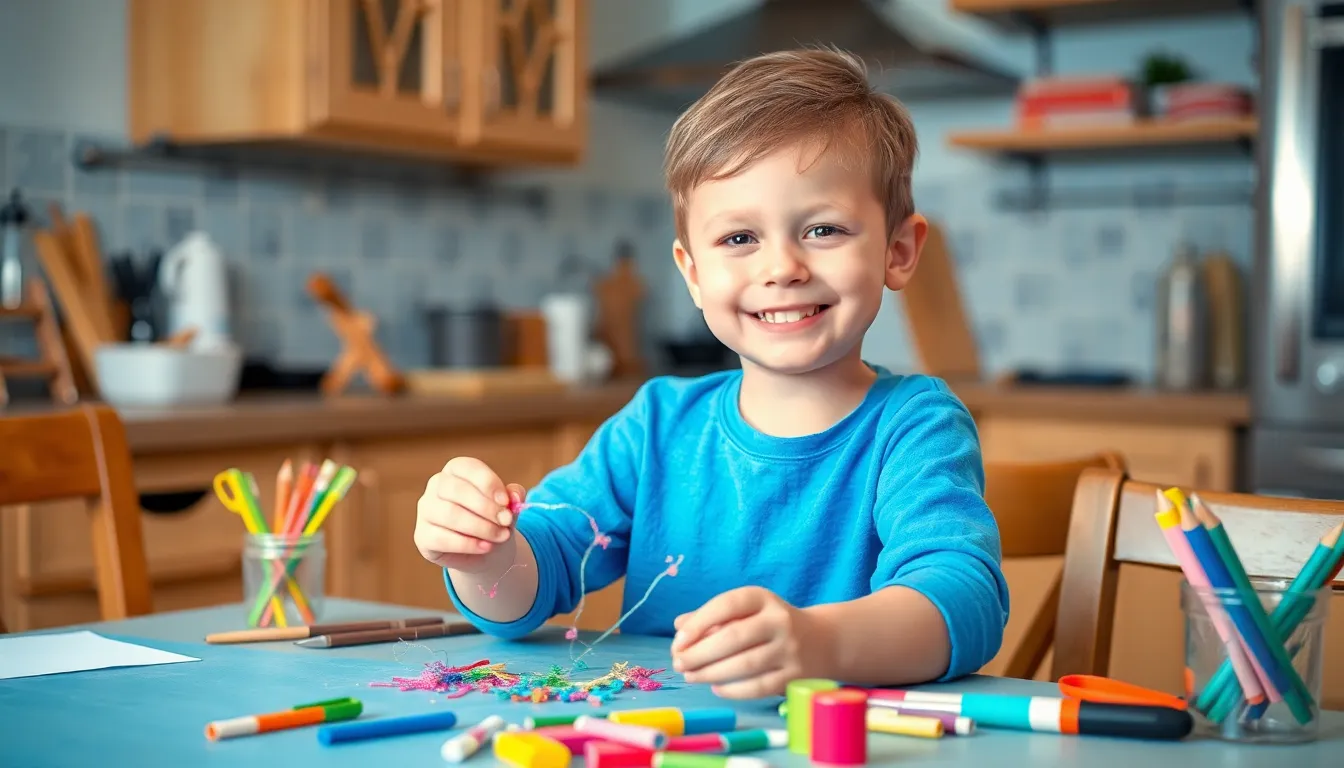In a world where self-doubt can feel like a stubborn shadow, raising confident kids is like giving them a superpower. Imagine your child strutting into a room, exuding the kind of confidence that could make even a catwalk model jealous. It’s not just about boosting their ego; it’s about equipping them with the tools to tackle life’s challenges head-on.
Confidence isn’t something kids are born with; it’s a skill they develop through experiences, encouragement, and a sprinkle of humor. Picture this: a child who believes they can climb the tallest mountain or sing like a rock star—without a hint of stage fright. With the right guidance, parents can turn their little ones into fearless adventurers ready to take on the world. So let’s dive into the fun and effective ways to raise kids who not only believe in themselves but also inspire others to do the same.
Table of Contents
ToggleUnderstanding Confidence in Kids
Confidence in children shapes their ability to navigate the world. Developing self-assurance leads to healthier interactions and a greater willingness to take risks.
What Is Confidence?
Confidence refers to a child’s belief in their abilities and judgment. It’s not limited to specific areas but spans across various aspects of life, including academics, sports, and social interactions. Children who exhibit confidence feel empowered to make decisions, try new activities, and face challenges. This belief often stems from past experiences and the encouragement they receive from parents and peers.
Why Is Confidence Important?
Confidence plays a crucial role in a child’s overall development. It influences their willingness to engage with others and pursue new opportunities. Self-assured kids tend to show resilience when facing setbacks, helping them overcome obstacles more effectively. Studies indicate that confident children often perform better in school, engage in positive social behaviors, and maintain better mental health. Building confidence lays the foundation for lifelong success, enabling them to embrace challenges and pursue goals without fear.
Strategies for Raising Confident Kids

Building confidence in children requires intentional strategies. Parents can implement various approaches to foster self-assurance and resilience.
Encouraging Independence
Encouraging independence plays a key role in building confidence. Assigning age-appropriate chores helps children develop responsibility and self-reliance. Allowing kids to make choices nurtures their decision-making skills. Providing opportunities for problem-solving enables them to overcome challenges autonomously. Support from parents should focus on guidance rather than control, promoting a sense of ownership over their actions.
Fostering a Growth Mindset
Fostering a growth mindset is essential for encouraging children to embrace challenges. Highlighting the value of effort over perfection instills resilience in the face of setbacks. Praising their persistence fosters an understanding that abilities can improve with practice. Sharing stories of perseverance reinforces the idea that failure serves as a stepping stone to success. Children learn to view obstacles as opportunities, boosting their confidence in tackling new tasks.
Role of Parents in Building Confidence
Parents play a crucial role in fostering confidence in their children. Through intentional actions and supportive communication, parents can significantly impact how children perceive themselves.
Positive Reinforcement Techniques
Positive reinforcement involves recognizing and rewarding children’s efforts and achievements. When parents celebrate small victories, they promote a sense of accomplishment. Regularly acknowledging accomplishments, whether in academics or personal growth, builds self-esteem. Encouraging children to tackle challenging tasks reinforces the belief that their abilities can improve with effort. Offering specific praise, such as complimenting a child’s determination in completing a project, encourages persistence. By consistently applying these techniques, parents help children internalize positive feedback, making them more likely to take risks and try new activities.
Effective Communication Skills
Effective communication enhances a child’s confidence. Parents should practice active listening, allowing children to express thoughts and feelings without interruption. Asking open-ended questions invites deeper conversations, fostering trust. Communicating expectations clearly helps children understand what success looks like. Encouraging children to discuss their ideas and opinions empowers them to voice themselves. When parents model respectful communication, children learn to interact positively with others, enhancing social confidence. Using constructive language nurtures a supportive environment, enabling children to feel secure and valued.
The Impact of Environment on Confidence
Children’s environments significantly influence their confidence levels. Factors such as schools and social interactions shape a child’s sense of self.
School and Social Interactions
Engagement in school activities often affects children’s confidence. A nurturing classroom environment lets them express ideas without fear of judgment. Involvement in group projects fosters teamwork and communication skills, enhancing social confidence. Teachers who provide positive feedback further boost self-esteem. Children recognize their abilities and contributions in such supportive settings. Academic challenges encourage resilience, teaching them to approach hurdles with determination.
Peer Influence and Relationships
Peers play a crucial role in building or undermining confidence. Positive friendships offer encouragement, helping children feel valued and accepted. When children support each other, they develop a sense of belonging. Conversely, negative peer interactions can lead to self-doubt. Bullying or exclusion can diminish a child’s self-worth. Healthy relationships teach empathy and social skills, enabling children to navigate social landscapes effectively. Fostering strong peer connections enhances emotional resilience and self-assurance.
Raising confident kids is a journey that requires intentional effort and nurturing. By fostering an environment where children feel safe to express themselves and take risks, parents can help them develop a strong sense of self-worth. Encouraging independence and celebrating effort over perfection lays the groundwork for resilience and adaptability.
It’s essential to engage in open communication and provide positive reinforcement, allowing kids to understand their value and capabilities. With the right support and guidance, children can grow into self-assured individuals ready to tackle life’s challenges and inspire those around them. Confidence truly is a superpower that can shape their future in remarkable ways.




